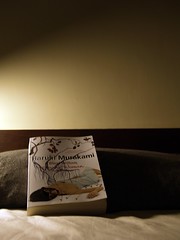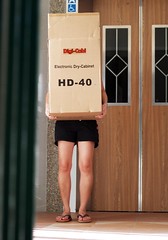
Customised book cover and photo by J/TOHA
It's National Day and even if you loathe the parade, the battlesome jetfighters and those "community" songs of patriotism that keep reproducing themselves year after year...as an acquisitive Singaporean, you've got to love sales! And the one to go to is Kinokuniya Bookstores's storewide 20% discount, where if you are of "the reading sex", you can pick up Haruki Murakami's new collection of short stories Blind Willow, Sleeping Woman.
“It's very important for people to learn to think about the inner life of people, people who are like themselves and different from themselves. Thinking about people different from oneself is fundamental to democracy,” says Nussbaum, whose 1995 book, Poetic Justice: The Literary Imagination and Public Life, argued that political leaders should read novels to learn empathy. “The novel is particularly good at getting you to see emotions in context ... and that's a very important political thing.” (Globe and Mail, 5 Aug06)
I wonder how a politician might read Haruki Murakami. His novels are often marketed as hip fantasy pop-fiction about the individual in a sort of urban purgatory. In a novel like Kafka on the Shore, this can become a self-parodying nightmare of Murakamism (e.g. symbolic incest in a parallel universe!). But I think his engagement with Japanese history and society, a distrust and distaste for an extreme rightist Japan and its impact on subsequent generations of Japanese people, is often overlooked. In his short fiction, this may be clearer.
 One of my favourite short stories in Blind Willow, Sleeping Woman" is "Where I'm likely to Find It". A man suddenly goes missing and his wife enlists the help of a private investigator, the narrator, who takes a special interest in such disappearing folks. The investigator finds out that the man dislikes taking the lift and prefers taking the stairs to his expensive 26th floor apartment. The narrator is ultimately drawn to the landing between the 25th and 26th floor, where the landlord has placed a sofa and mirror, and suspects a relationship between the landing and the man's disappearance. As he investigates the landing, he speaks to a jogger who runs up the stairs, an elderly man and a young girl. The man is found 20 days later in another city.
One of my favourite short stories in Blind Willow, Sleeping Woman" is "Where I'm likely to Find It". A man suddenly goes missing and his wife enlists the help of a private investigator, the narrator, who takes a special interest in such disappearing folks. The investigator finds out that the man dislikes taking the lift and prefers taking the stairs to his expensive 26th floor apartment. The narrator is ultimately drawn to the landing between the 25th and 26th floor, where the landlord has placed a sofa and mirror, and suspects a relationship between the landing and the man's disappearance. As he investigates the landing, he speaks to a jogger who runs up the stairs, an elderly man and a young girl. The man is found 20 days later in another city. Written in that terse, hard-boiled detective fiction style, this is a story where nothing happens, yet everything happens. We are invited to get distracted by the promise of mystery and to "solve" it. And there is just enough to suggest that there is, indeed, something mysterious about the landing, the mirror and the nondescript inhabitants of the apartment block. Yet the re-appearance of the husband in another city, having no memory of the past 20 days, does not confirm or disprove the conjecture that this landing or its mirror could be a mysterious "door" to another world or life. What we are left with is the narrator's desire (and by now, also the reader's desire) for mystery, its signs and symbols - as doors away from the "real world". We almost wished the man has escaped forever from his neurotic mother, his type-A wife and his Merrill-Lynch job.
All this underlies the sly seduction of Murakami's stories. When you pick up a book by Murakami, you know almost for certain that he will (or rather, his narrators or protagnosts) hold up a mirror that shows a possible reality just left of centre - not too distorted that you cannot recognise it, or ultimately accept. But sufficiently out-of-the-real for it to challenge the small oppressions that we have come to accept of too conservative and sanitised a mind, too powerful and corrupt a government, or too complacent and bankrupt a society.
The politicians may be too busy with the parade and fireworks to read a book this 9 August. But Kinokuniya must be thankful there's still 4million other folks with time to spare! Happy National Day!






No comments:
Post a Comment